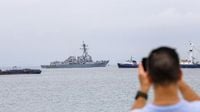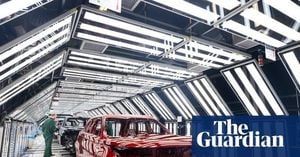In a dramatic escalation of the United States’ war on drugs, President Donald Trump’s administration has launched a sweeping military campaign in the Caribbean, targeting drug trafficking networks operating near Venezuela’s coast. The move—which has included a high-profile strike on a suspected drug boat and the deployment of thousands of U.S. troops and advanced military hardware—has sent ripples across the Americas, raising questions about the future of U.S.-Venezuelan relations, regional stability, and the broader fight against transnational crime.
According to reporting from FOX News and the Council on Foreign Relations, the operation began in late August 2025, when the Trump administration deployed at least eight warships, a submarine, and approximately 4,000 Marines and sailors to the Caribbean Sea, just off Venezuela’s coast. This formidable show of force was part of a new initiative to combat drug cartels that the U.S. government has designated as foreign terrorist organizations (FTOs). The mission followed a secret directive, reportedly signed by President Trump in July, authorizing military action against these groups.
The campaign’s most visible action came on September 2, 2025, when U.S. military forces conducted a kinetic strike against a boat identified as belonging to the Tren de Aragua gang, a Venezuela-based criminal organization notorious for its involvement in drug trafficking, illegal mining, kidnapping, and extortion. President Trump announced, “U.S. Military Forces conducted a kinetic strike against positively identified Tren de Aragua Narcoterrorists in the SOUTHCOM area of responsibility.” The strike, which took place in international waters, resulted in the deaths of 11 people, all of whom were described as “terrorists” by U.S. officials.
Secretary of War Pete Hegseth, speaking on FOX & Friends the next day, confirmed the strike and stated bluntly that the individuals on the boat had been eliminated. He further emphasized that the United States plans to carry out more such strikes against drug traffickers designated as terrorists. The Drug Enforcement Administration (DEA), which has long battled the flow of dangerous drugs onto American streets, has been closely involved in these operations. Special Agent Frank Tarentino of the DEA’s New York Division explained that the war on drugs is evolving, with military assets now playing a direct role in interdiction efforts traditionally handled by law enforcement.
The Trump administration’s strategy marks a significant departure from previous U.S. policy in the region. In 2024, the government officially sanctioned the Tren de Aragua gang as a transnational criminal organization and designated it as an FTO, along with several other groups from Colombia, El Salvador, and Mexico. The move to treat these organizations as terrorist threats has enabled the use of military force, a step that has not been without controversy.
Political reactions in Washington have been swift and varied. As Democrats grapple with dismal poll numbers, party members are staking out their positions on Trump’s aggressive approach to crime, border security, and the economy. Jose Aristuimuno, a former DNC press secretary, suggested that Democrats might benefit from collaborating with the president on issues of crime and public safety rather than opposing him outright. Meanwhile, White House insiders and political strategists are debating the long-term implications of militarizing the war on drugs and the potential fallout for U.S. domestic politics.
The escalation has not gone unnoticed in Venezuela. President Nicolás Maduro condemned the deployment of U.S. military assets, calling it “the greatest threat that has been seen on our continent in the last one hundred years.” Seeking to de-escalate tensions, Maduro’s defense minister announced on September 7 that Venezuela had deployed 25,000 troops to its border and coastal regions to combat drug trafficking. Yet, incidents have continued: on September 4 and again on September 5, Venezuelan military aircraft flew near U.S. Navy ships, prompting stern warnings from Pentagon officials. President Trump, asked about the risk of confrontation, stated, “if they do put us in a dangerous position, they’ll be shot down.”
The U.S. military buildup is set to intensify further. The Trump administration has ordered ten F-35 fighter jets to Puerto Rico, part of its ongoing counter-drug and counterterrorism mission in the Caribbean. The jets are expected to arrive during the week of September 8–14, 2025, signaling that the United States is prepared for a sustained campaign in the region.
The repercussions of these actions extend far beyond military strategy. The U.S. Department of Homeland Security announced on September 3 the revocation of Temporary Protected Status (TPS) for approximately 250,000 Venezuelans living in the United States prior to 2021. This move, justified by claims of improved conditions in Venezuela, has sparked concern among advocates who warn that further escalation could worsen the situation on the ground and prompt a surge in migration. Nearly eight million Venezuelans have already fled their country since 2014, and regional neighbors are bracing for the possibility of a new wave of refugees should violence intensify.
Economic interests are also at stake. U.S. oil giant Chevron only recently resumed oil production in Venezuela and began shipping crude to the United States in August 2025. Any further deterioration in U.S.-Venezuelan relations could jeopardize these operations, disrupt legal maritime traffic in the Caribbean, and even affect shipping through the Panama Canal if vessels are misidentified as drug traffickers.
The international response has been mixed. Mexico’s foreign affairs secretary has called for a peaceful solution to the conflict, while Ecuador’s President Daniel Noboa thanked the U.S. for its efforts to “actually eliminate any terrorist threat.” Trinidad and Tobago’s Prime Minister Kamla Persad-Bissessar voiced support for the U.S. strike, but other Caribbean Community (CARICOM) members have urged open lines of communication to avoid future surprises. Colombia’s President Gustavo Petro, however, criticized the strike, arguing that it “violates the universal principle of proportionality of force and results in murder.” Human rights groups have condemned the operation as an extrajudicial killing and demanded legal justification from the White House.
Global powers have also weighed in. Russia, a longtime ally of Venezuela, accused the United States of exerting “blatant pressure” on the Maduro government, while China denounced the U.S. naval deployment as “interference of external forces in Venezuela’s internal affairs under any pretext.”
As the Trump administration doubles down on its military-first approach to combating drug trafficking in the Caribbean, the world is watching closely. The stakes are high—not only for the U.S. and Venezuela, but for the stability of the region and the millions of lives affected by the ongoing crisis.




